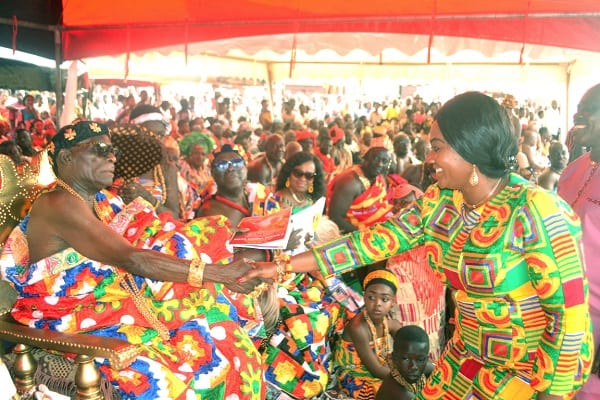Ghanaians through festivals celebrate their glorious heritage, culture and traditions .
The Akwambo celebration is celebrated in August by the individuals of Agona and Gomoa areas within the Central Locale of Ghana. Akwambo actually means “path-clearing”; and it is celebrated by the people of Agona within the Central Locale.
The Akwambo festival is as a rule a week long celebration to commemorate the journey and arrival of the founding settlers of the four towns of Gyinankoma, Ekrawfo, Atakwaa,and Otabenadze.
Akwambo was to begin with watched by the vagrant precursors of these individuals, whose essential part when they arrived in a modern put was clearing ways to the waterways, ranches and other communal places, thus a day was set aside for this reason and all those that utilized these ways were to assemble and set out on the work out.
Nowadays, exercises such as Durbar, music and move exhibitions, soccer recreations, family or community reunions and parades forms portion of the uncommon celebrations. Akwambo Celebration is celebrated by the tenants of the Agona region in central locale of Ghana.
The durbars are led by the community chiefs and their council of elders.
The durbar is usually marked with activities such as drumming, dancing, and speech presentations by political figures like the District Chief Executive (DCE) of the area as well as notable public figures that are indigenes.
Path clearing is the most important part of the festival. During this ritual, town people are expected to participate in clearing the roadside, cleaning of gutters and even weeding of bushy paths that lead to important places like streams and rivers.
This according to the elders of the towns is done to honour the first settlers of the area and show them that they are taking good care of the land they left in their care.
This part of the festival is held in high regards by all the participating communities and usually sees massive turnouts, with almost all town folks, whether old or young taking part in it. The durbars are led by the community chiefs and their council of elders.
The durbars are driven by the community chiefs and their chamber of senior citizens. The durbar is more often than not checked with exercises such as drumming, moving, and discourse introductions by political figures just like the Area Chief Official (DCE) of the zone as well as eminent open figures that are indigenes. Path clearing is the foremost imperative portion of the celebration.
Amid this custom, town individuals are anticipated to take part in clearing the roadside, cleaning of canals and indeed weeding of bushy ways that lead to vital places like streams and waterways. This agreeing to the elders of the towns is done to respect the primary pioneers of the region and appear them that they are taking great care of the arrive they cleared out in their care. This portion of the celebration is held in tall respects by all the partaking communities and as a rule sees enormous turnouts, with nearly all town people, whether ancient or youthful taking portion in it.
Like most celebrations in Ghana, amid Akwambo, offerings are made to the predecessors and divine beings of the arrive whom they accept secure them from hurt and fiendish.
These offerings takes put within the frame of pouring drink on the ground and supplicating to the predecessors to proceed to offer them assurance and great gather as well as keep them from harm’s way. All these exercises are driven by the chiefs of the different towns, with offer assistance from their board of elders.
Activities
Path Clearing
The most important part of Akwambo is the ritual path clearing that is done in honor of the first settlers who established the town. Every member of the community is expected to participate in clearing the paths and roads leading to the town, as well as those that provide access to streams, rivers, farms, shrines, and communal spaces. Unpaved footpaths are weeded and maintained, while paved roads are ritually swept with branches, brooms, and fans made of leaves.
The following day, the total community gathers at the genealogical holy places and drink is poured by the chief to the hereditary spirits to thank them for their protection amid the past year and after that ask for more favoring, copious precipitation and great gather for the following year.
At the stream or riverside where a few of the penances are advertised, crocs and other species of angle come out to appreciate the pounded yams sprinkled on the water.
With their bodies spread with clay, the individuals at that point parade with twigs and tree branches through the town in bunches in the midst of drumming, moving and terminating of musketry.
In a parade, they go through the foremost courses and after that to the durbar ground to meet the chiefs and his elders.
Durbar
A durbar is usually held near the end of the Akwambo festival. Community leaders and chiefs are carried on covered litters in a procession of drummers, dancers, singers, musicians, and soldiers. A public reception follows, during which speeches are made by politicians and other dignitaries.
Also at this time community members may bring forward any concerns or problems needing the leaders’ attention.
There may be a vigil kept at night and patronized basically by the youth. It may be a time when individuals come together to resume family and social ties. Performing bunches, which are torpid are revitalized and unused bunches started.
source: myghanadaily.com





